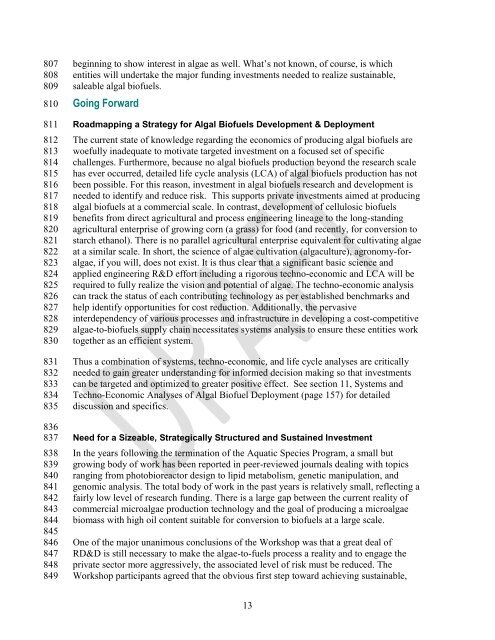Download the Algal Biofuels Roadmap draft document - Sandia
Download the Algal Biofuels Roadmap draft document - Sandia
Download the Algal Biofuels Roadmap draft document - Sandia
Create successful ePaper yourself
Turn your PDF publications into a flip-book with our unique Google optimized e-Paper software.
807<br />
808<br />
809<br />
810<br />
811<br />
812<br />
813<br />
814<br />
815<br />
816<br />
817<br />
818<br />
819<br />
820<br />
821<br />
822<br />
823<br />
824<br />
825<br />
826<br />
827<br />
828<br />
829<br />
830<br />
831<br />
832<br />
833<br />
834<br />
835<br />
836<br />
837<br />
838<br />
839<br />
840<br />
841<br />
842<br />
843<br />
844<br />
845<br />
846<br />
847<br />
848<br />
849<br />
beginning to show interest in algae as well. What‘s not known, of course, is which<br />
entities will undertake <strong>the</strong> major funding investments needed to realize sustainable,<br />
saleable algal biofuels.<br />
Going Forward<br />
<strong>Roadmap</strong>ping a Strategy for <strong>Algal</strong> <strong>Biofuels</strong> Development & Deployment<br />
The current state of knowledge regarding <strong>the</strong> economics of producing algal biofuels are<br />
woefully inadequate to motivate targeted investment on a focused set of specific<br />
challenges. Fur<strong>the</strong>rmore, because no algal biofuels production beyond <strong>the</strong> research scale<br />
has ever occurred, detailed life cycle analysis (LCA) of algal biofuels production has not<br />
been possible. For this reason, investment in algal biofuels research and development is<br />
needed to identify and reduce risk. This supports private investments aimed at producing<br />
algal biofuels at a commercial scale. In contrast, development of cellulosic biofuels<br />
benefits from direct agricultural and process engineering lineage to <strong>the</strong> long-standing<br />
agricultural enterprise of growing corn (a grass) for food (and recently, for conversion to<br />
starch ethanol). There is no parallel agricultural enterprise equivalent for cultivating algae<br />
at a similar scale. In short, <strong>the</strong> science of algae cultivation (algaculture), agronomy-foralgae,<br />
if you will, does not exist. It is thus clear that a significant basic science and<br />
applied engineering R&D effort including a rigorous techno-economic and LCA will be<br />
required to fully realize <strong>the</strong> vision and potential of algae. The techno-economic analysis<br />
can track <strong>the</strong> status of each contributing technology as per established benchmarks and<br />
help identify opportunities for cost reduction. Additionally, <strong>the</strong> pervasive<br />
interdependency of various processes and infrastructure in developing a cost-competitive<br />
algae-to-biofuels supply chain necessitates systems analysis to ensure <strong>the</strong>se entities work<br />
toge<strong>the</strong>r as an efficient system.<br />
Thus a combination of systems, techno-economic, and life cycle analyses are critically<br />
needed to gain greater understanding for informed decision making so that investments<br />
can be targeted and optimized to greater positive effect. See section 11, Systems and<br />
Techno-Economic Analyses of <strong>Algal</strong> Biofuel Deployment (page 157) for detailed<br />
discussion and specifics.<br />
Need for a Sizeable, Strategically Structured and Sustained Investment<br />
In <strong>the</strong> years following <strong>the</strong> termination of <strong>the</strong> Aquatic Species Program, a small but<br />
growing body of work has been reported in peer-reviewed journals dealing with topics<br />
ranging from photobioreactor design to lipid metabolism, genetic manipulation, and<br />
genomic analysis. The total body of work in <strong>the</strong> past years is relatively small, reflecting a<br />
fairly low level of research funding. There is a large gap between <strong>the</strong> current reality of<br />
commercial microalgae production technology and <strong>the</strong> goal of producing a microalgae<br />
biomass with high oil content suitable for conversion to biofuels at a large scale.<br />
One of <strong>the</strong> major unanimous conclusions of <strong>the</strong> Workshop was that a great deal of<br />
RD&D is still necessary to make <strong>the</strong> algae-to-fuels process a reality and to engage <strong>the</strong><br />
private sector more aggressively, <strong>the</strong> associated level of risk must be reduced. The<br />
Workshop participants agreed that <strong>the</strong> obvious first step toward achieving sustainable,<br />
13


